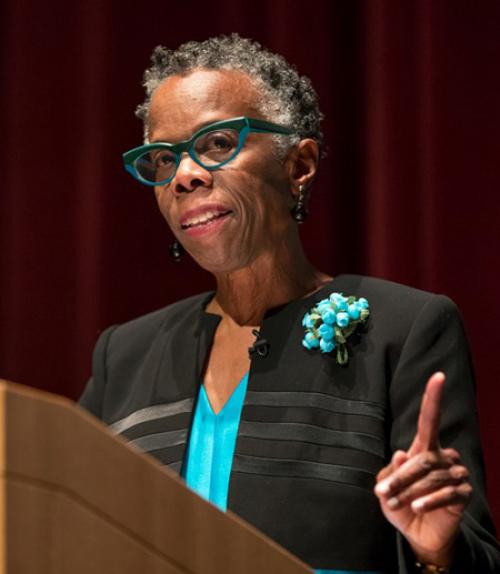In an era that swirls with government distrust, national political cynicism and questions of character among authorities, public service can rescue us, said New York State Supreme Court Justice Debra James ’75, J.D. ’78, at the June 8 Olin Lecture in Bailey Hall during Reunion Weekend.
The justice explained that corruption among government officials is what Americans fear most, citing a 2017 national poll. “We Americans must not allow such fears,” said James, who is an Arts & Sciences alumna. “Instead, we as citizens must remember those in public service who have been models of excellence in governance.
“Using their work as a standard, we must become more active and more engaged, whether in stepping up to the plate ourselves to pursue public service, supporting others to do so, or in becoming ever more engaged as citizens at the federal, state and local levels,” she said.
James’ lecture, “Daily More Useful: My Life in Public Service,” borrows its title from the inscription on the Andrew Dickson White Memorial Gate (known as Eddy Gate) in Collegetown: “So enter that daily thou mayest become more learned and thoughtful. So depart that daily thou mayest become more useful to thy country and to mankind.”
James highlighted two alumni in history who were committed to public service: George Washington Fields, Class of 1890, the Cornell Law School’s first African-American graduate and the only former slave to graduate from Cornell; and social activist Florence Kelley, Class of 1882, who wrote a thesis on disadvantaged children. Kelley took up public service and carried it forward in the battle for civil rights and new labor laws, said James.
As a founder of the NAACP, Kelley fought against lynching and racially discriminatory school funding. Fields advocated for black voting rights, was active in Virginia civic affairs and elected to the Virginia House of Delegates. “We are indebted to [their] legacies … [as they] paved the way for alumni such as me to engage public service,” she said.
Straight from Cornell Law School, James gained experience as a trial lawyer in the New York City Law Department. After three years, she moved to the department’s appeals division and won two high-profile cases in high-level appellate courts. In her last public-sector attorney position, James became the first general counsel of the Roosevelt Island Operating Corp., or RIOC, working on a variety of cases.
She provides service to her professional community as co-chair of the New York City Bar Association’s (NYCBA) Subcommittee on Diversity in the Judiciary, a part of the larger Enhance Diversity in the Profession Committee, and as a member of the NYCBA’s Task Force on Mass Incarceration. She is chair emeritus of the group’s Minorities in the Courts Committee.
In 2013 James was elected to the New York State Supreme Court, where she presides over hundreds of civil actions.
James has given back to Cornell, too, by serving on the President’s Council of Cornell Women, the Law School Dean’s Advisory Council, the Cornell Black Alumni Association and other alumni groups.
Florence Kelley and George Washington Fields upheld Andrew White’s charge inscribed on Eddy Gate, James explained: “With my work in public service and civic engagement, I will continue to strive to be daily more useful,” she said. “Let us each carry on the responsibility assigned.”
This story also appeared in the Cornell Chronicle.




